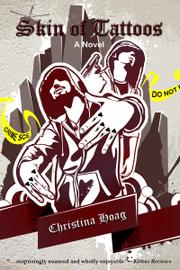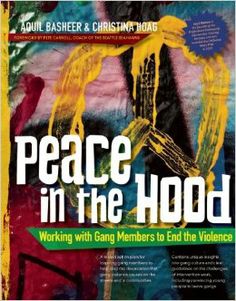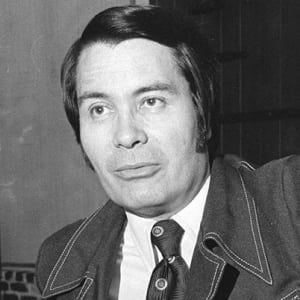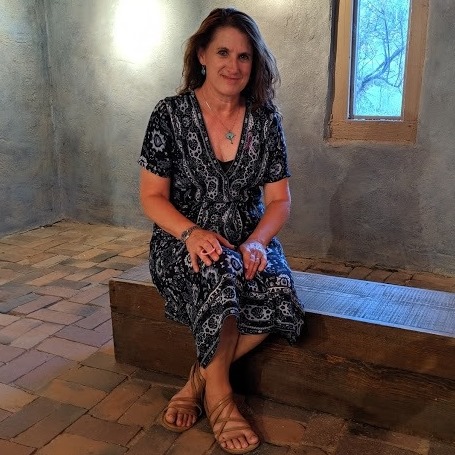 As a reporter, Christina Hoag has dealt with some of the most dangerous situations a journalist can experience, from facing down Colombian guerrillas to interviewing gang members and corrupt presidents. All of which was a great for learning to deal with the modern publishing industry. Hoag has indeed used that experience – and some from her own youth – to help inform her new career as Young Adult author. She spoke with me recently to talk about both her YA books and her gritty and incredibly compelling adult novel, “Skin of Tattoos.”
As a reporter, Christina Hoag has dealt with some of the most dangerous situations a journalist can experience, from facing down Colombian guerrillas to interviewing gang members and corrupt presidents. All of which was a great for learning to deal with the modern publishing industry. Hoag has indeed used that experience – and some from her own youth – to help inform her new career as Young Adult author. She spoke with me recently to talk about both her YA books and her gritty and incredibly compelling adult novel, “Skin of Tattoos.”
Open Mic: You’ve been a journalist for your entire career. Was it difficult for you to transition into being an author?
Hoag: Being a journalist both helped and hindered me. Journalism is a great background for being a novelist because you know what a story is, you know basically how to write, you make deadlines, and you’re used to working with language. On the other side, I had to learn to put emotion into my story. As a journalist, you have to be neutral. You always look for balance in your story. You have to have the argument, the counterargument and so on. So when writing a novel, I had to get myself untrained from that and be much more emotional in my storytelling. I have to really put my head into the head of the character and tell the story from that point of view rather than the neutral observer. With my first novel, I was 170 pages into it when I looked back at what I had written and thought “God, this looks like a reporter just saying this happened and this happened.” I threw it all out and started again. So it has been a process.
Open Mic: I interviewed Dick Belsky, who is a former reporter for the New York Post, in a previous Open Mic. He told me that when he first started writing mysteries and suspense novels, his editors would come back and say they really liked the writing but that he needed to write more. His work was actually too concise and he needed to lengthen things out. That is something a daily journalist is almost never asked to do.
Hoag: Yeah, I had to learn how to do more interior monologue and description. With “Skin of Tattoos” I went back, added more in and the word count got up to almost 100,000. Then I had to cut out 14,000 words, but then it felt too skeletal so I had to add more back in. It’s learning how to play out the moment of suspense or the moment of romance, to really get into that emotion and not just say it happened. You’ve got to really get into what the character is feeling, what they want, what the stakes are.
Open Mic: You’ve covered gang violence a lot during your career. It seems like a problem that is as old as mankind itself. Tell me about “Peace in the Hood.”
Hoag: I was working for the Associated Press in L.A. and my beat was urban affairs, so I covered a lot of what the city was doing to combat gangs and to prevent kids from joining gangs. I came across what is called gang intervention, which is the process of using former gang members or more mature guys who have aged out of the gang life to go back into the neighborhood as street peacekeepers, mentors and role models to the younger guys. They have credibility in the neighborhood and the younger set sort of looks up to the older set, whereas nobody’s going to pay attention to a social worker or a cop because they’re not from that world. I covered a story about a guy named Aquil Basheer, who ran an academy in South L.A. that trained these former gang members and anyone else who was interested in being a street peacekeeper and mediating gang warfare. We ended up collaborating on the book, “Peace in the Hood.” I was the writer of the book, but it’s his model for quelling the ongoing cycle of gang violence.
 Open Mic: You’ve been in some of the most dangerous situations a reporter can find themselves in. How has that impacted your writing?
Open Mic: You’ve been in some of the most dangerous situations a reporter can find themselves in. How has that impacted your writing?
Hoag: Well, they do change your worldview. When you see people living in shanty towns and garbage dumps in Central America, you understand why we have caravans of people that are so desperate that they’re trekking thousands of miles on foot to get to some place that they think is some sort of Disneyland. That led to one of my books, “Skin of Tattoos,” which is about a gang member and gang violence. I was on a magazine assignment in El Salvador around 2000, and I interviewed some young men on the streets there. Some had been deported from Los Angeles, or were fugitives fleeing crimes, and were now stuck in El Salvador, which they didn’t know because they were brought up in the United States. Some of them barely spoke Spanish, and they certainly couldn’t read Spanish that well, so they were really a fish out of water. I wanted to tell the story behind these guys who look pretty foreboding with the tattoos and the shaved head and what not. But they’re mostly just scared kids. They want a job. So with that book I wanted to tell their story and their families, of trying to make it in L. A. Journalism has certainly given rise to a lot of other story plots, character details, settings, but overall I think it’s given me a more sympathetic or empathetic view of people who aren’t as fortunate to be in this country.
Open Mic: You mentioned “Skin of Tattoos,” which is set in the ganglands of L.A. Did you have anyone from the life read it and fact checking you as you went along?
Hoag: Not really. I researched that book extensively and I’ve interviewed many gang members for different stories I was reporting on, but not specifically for the book. I also watched YouTube videos to get the lingo and the way they talk and that kind of thing. It did take a long time and I did lose confidence a couple of times. I’d put it down and people would ask “What happened to that project, Christina?” Then I’d pick it up again. I was a volunteer creative writing teacher at a state prison here in Los Angeles County and I gave it to a couple of the guys, who loved it. One of them said he gave it to some Latino prisoners who had been in a gang, and the report came back that I had done a great job.
 Open Mic: I have a friend from my youth who got into a gang and then got into serious trouble that landed him in Folsom Prison. I haven’t seen him in years, but I know even into our late 30s he was still struggling. He’d been out for a while and he was still struggling to stay employed. Once you’re in the system, life can be pretty unforgiving.
Open Mic: I have a friend from my youth who got into a gang and then got into serious trouble that landed him in Folsom Prison. I haven’t seen him in years, but I know even into our late 30s he was still struggling. He’d been out for a while and he was still struggling to stay employed. Once you’re in the system, life can be pretty unforgiving.
Hoag: That’s very true. Each county has these big gang lists, and once you get your name on one of those lists it’s very hard to get your name off. And once you get marked in that way as well as a criminal record, it makes getting employment difficult. I put that in the book. My main character practically begs for a job, but he can’t really find anything. Many of these guys have never been formally employed. They’ve only been employed by the gang. Then there’s the whole emotional aspect, which I also get into in “Skin of Tattoos.” Gang life is all they know, that’s their world. So leaving the gang is an emotional thing to them because that’s who they’ve grown up with, that’s who they hang out with. It’s not that easy to pick up and move to another place. Some people do end up doing that, and that’s usually the only way they can get out. But it requires a lot of strength to move away from everything you’ve known. So I tried to get at the whole emotional thing in the book. It’s not meant to glamorize gangs in any way, shape, or form.
Open Mic: Do you see yourself writing a nonfiction book about your experiences with gangs and the other dangerous situations you’ve been in?
Hoag: People ask me that a lot. Maybe one day. I’ve written nonfiction my whole life, so I’m really into my fiction right now. Fiction is exciting because you never really know what’s going to come out as you write. You’re creating stuff, and that’s exciting to me. But maybe I will. Foreign reporting was the highlight of my career, so maybe I will do that one day.
Open Mic: You were also a writing instructor in the prison system and with at-risk young girls. Which of those two is tougher to reach?
Hoag: Definitely the teenage girls. They were from South and East Los Angeles, and they weren’t too interested in anything. They were in the class because they had to be there, so it was very difficult to keep them focused. One of the schools I was in was an alternative school, which meant these girls had all left their regular high school for some reason, ranging from pregnancy to drugs. They’d been in probation camps, juvenile hall, that kind of stuff. They were a tough bunch. We had a fistfight erupt in one session, which was interesting. It took a long time to win their trust, but eventually they opened up a little bit. They hadn’t had a lot of success or praise in their lives, and they weren’t very academically oriented, so they really appreciated any little bit of praise. Encouragement was also a good way to build trust because they hadn’t had a lot of that. The men in the prison class were mainly guys on life without parole, and they were just so grateful to have people come in from the outside and to see a different face. Many of them don’t have a lot of visits. Their visits drop off after a couple of years, so for many of them I was like their monthly visit. I felt like I was really contributing to their lives, which was a nice feeling.
Open Mic: America seems fascinated these days with stories of prison life, and particularly with prison life for hardcore, dangerous criminals. Is that a subject you will ever tackle, something that takes place inside the system?
Hoag: Sure. It could work its way into something. I look at everything in my life experience as grist for the mill.
Open Mic: You’ve now done an adult noir and a Young Adult novel. Most writers are told that at least early on in their fiction career they need to stick to one genre or category. How did it come about for you to write two such different books this early in your career?
Hoag: Nobody actually told me that, number one, so I didn’t realize that. “Skin of Tattoos” actually started out as a Young Adult novel, but my agent couldn’t sell it that way. It was too much of a boy book, and YA is very much a girls’ genre. After I got it back from the agent, I decided to make it an adult novel. I upped the character’s age. He’s 20 in the novel and I think I had him at 17 in the original version. Just adding those few years, making him more of an adult legally and emotionally, freed me up to do things with the character.
 It still has the coming-of-age feel to it. There’s a big plotline with his father and the family that makes like an older YA book aimed at the older, later end of the adolescent spectrum. “Girl on the Brink” is much more of a teenage book. It’s about a girl who gets involved with the wrong guy and goes through some pretty horrendous things and then her journey back from that. It’s about dating violence, inspired by something I went through. I felt very strongly that I wanted to reach teenage girls as they were starting their dating lives, to teach them to look for these red flags because you can mistake them when you don’t know what they are. Nobody tells you what they are until it’s too late. That’s why I wrote that book.
It still has the coming-of-age feel to it. There’s a big plotline with his father and the family that makes like an older YA book aimed at the older, later end of the adolescent spectrum. “Girl on the Brink” is much more of a teenage book. It’s about a girl who gets involved with the wrong guy and goes through some pretty horrendous things and then her journey back from that. It’s about dating violence, inspired by something I went through. I felt very strongly that I wanted to reach teenage girls as they were starting their dating lives, to teach them to look for these red flags because you can mistake them when you don’t know what they are. Nobody tells you what they are until it’s too late. That’s why I wrote that book.
Open Mic: Do you ever see yourself sticking to one genre?
Hoag: I’m currently writing another YA, so I think I am going to stick with that genre. There’s a couple of couple of stories I want to tell as YA. I have a couple of historical sagas I might do too, but those are definitely adult. The reception to “Girl on the Brink” has been actually pretty good. I’ve had speaking engagements at book clubs and writing groups, and I’ve had women tell me they went through those experiences too. Adult women have ended up buying the book either to give to schools or to give to a teenage girl that they know or in their family. I got a lot of really good feedback from that book and a lot of good reviews, so I think it’s a valuable book.
Open Mic: How do you handle rejection?
Hoag: If someone criticized one of my big stories as a journalist, and people certainly did, it never really hurt that much. But when it’s a story that you actually created, that knife goes right in. I try not to take it too personally and to understand that what appeals to one reader, another reader will hate. I don’t think there is anyone at any stage in their career where the sting of criticism doesn’t smart. You have to leave it and let it go cold until you can more objectively look at what the reader is saying. If at least two people come up with the same observation, it’s probably valid. Then you have to go back to the book and see if you can fix what they are talking about.
One time where I did crash badly came when I sent my agent at the time an early version of “Girl on the Brink,” and she was kind of scornful of it. I showed it to her way too early. It was still in the first draft stage, and she really ripped it to shreds. I was just crushed. I basically lay on the couch for a week. Finally, I decided to put that book aside and I went back to “Skin of Tattoos.” You just have to lift yourself up. Go ahead and feel sorry for yourself and lick your wounds for a day or two, but then you’ve got to get out of it and move on. Figure out what you can learn from it. It’s a process, and not an easy one to deal with, but it is part of the creative field. No one is immune to it.
Open Mic: Do you ever use a freelance editor?
Hoag: I haven’t but I do that for other people. I try and find a critique group instead where we swap manuscripts or chapters. I think that’s a tried and true way. It’s really good to get somebody who will read the whole thing from start to finish and give you a meaningful critique. But they are hard to find because you’re asking someone to read a whole book. You also want someone who’s going to tell you the truth, not just say, “It’s great, Christina.” That doesn’t tell you anything. You need someone to really tell you what it needs. But if you can’t find a critique group, a freelance editor is fine.
Open Mic: How do you craft characters? Do you develop them first and then go to the plot or the other way around?
Hoag: I usually have an idea of the character, and then as I start writing the first draft they tend to unfold. I start out with a skeleton and when I get into that first draft, I really start to put flesh on the bones. I see more about what they’re really about, who’s in their world, what motivates them. I don’t work a lot with outlines. I’ve tried and I wish I could, but it just doesn’t seem to work for me. I use the first draft as the outline. For me, I like to find the character as the story unfolds.
Open Mic: I’m glad you mentioned outlines because I was going to ask you about that and now you’ve answered that for me. So thank you!
Hoag: I know authors like Jeffery Deaver that do a book a year work from extensive plot outlines. They basically take 50-page outlines and flesh out each chapter using big charts on the wall with color-coded plot points, but that just doesn’t work for me. I wish it did because it would make the process so much faster. With my journalistic background I can write very fast, but writing fiction is just a whole other thing.
Open Mic: The business of writing is really hard, probably harder than the writing itself. What’s the one bit of advice about the industry you would give to a newbie writer?
Hoag: One is just to write your story. You have to write what you’re passionate about. Sometimes you’ll hit something that seems to hit a chord with readers and sometimes not so much. But I think you really just have to write what’s in you and not worry about trends, whether it’s paranormal romance or fantasy wizarding schools. You have to write what’s in you, do the best job you can and continually develop your craft. Novels are such unwieldy beasts. They’re huge things and you have to feel your way along with it and continually work on your craft.
 Open Mic: Let’s say I could put you together for dinner and a conversation with just one of the following three people. Which one would you choose and why? Your options are: cult leader Jim Jones, author S.E. Hinton or anti-apartheid icon Nelson Mandela.
Open Mic: Let’s say I could put you together for dinner and a conversation with just one of the following three people. Which one would you choose and why? Your options are: cult leader Jim Jones, author S.E. Hinton or anti-apartheid icon Nelson Mandela.
Hoag: I loved S.E. Hinton’s books when I was a kid, but I would say Jim Jones because I think it would be a fascinating conversation to learn how he saw the world and how he was able to establish churches and get people to follow him to Guyana, of all places. He would be a pretty interesting study, I would think.

